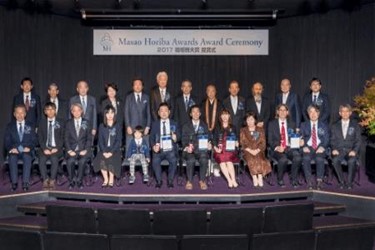'Science Connects Us' - 2017 Masao Horiba Award Winners Speak At Awards Ceremony In Kyoto

On October 17th, the award ceremony for the 2017 Masao Horiba Awards was held in Kyoto. The awards, which focus on a technical field that changes yearly, centered on water this year; “Water measurement enriching people's lives.”
Dr. Masayuki Adachi, Chief of the Organizing Committee for 2017 Masao Horiba Awards, gave the following comments:
The HORIBA Group was founded on electrochemical-based liquid analysis technology. Along with spectroscopy and fluid technology, it is one of the pillars of our group’s growth.
Various forms of this technology, from pH measurement to the measurement of various ions and dissolved substances in liquids, are an essential part of our daily lives and the development of our industries. In recent years, we have developed technology that detects not only substances with a low molecular weight, but giant molecules such as proteins and bacteria.
Global trends also indicate that technology is being developed every day to measure things that we could not measure before, allowing us to gain an increasingly detailed understanding of the world’s water resources.
And with a combination of cutting-edge measurement technology and information and communication technology, the water cycle is being monitored on a global scale in an attempt to achieve safe and comfortable water conditions worldwide.
This was the background for the theme of this year’s Masao Horiba Award. We received 29 entries from both within Japan and overseas. After strict judging, we selected three winners of the Masao Horiba Award and one winner of the Honorable Mention.
Dr. Ryoichi Ishimatsu of Kyushu University, whose award-winning research centered on electrochemical and photometric sensing for substances in water, said that “the motivation that drives my research was originally rooted in my own personal interest towards whatever I was studying, but receiving this award has shifted my thought process towards realizing technology that can be of greater societal use”.
Dr. Dai Kato of the National Institute of Advanced Science & Technology struck a similar tone: “I used to think of my research as my child, and feel the need to guard it. Now I realize that the more people that can find use out of my research, the more impactful it is”. Kato’s development of sputtered nanocarbon film-based electrodes with extended analyze zones brought him home the prize.
“In science, succession is key”, Dr. Shiho Tokonami of Osaka Prefecture University began shifting the evening to a bigger theme. “When people change, science can not change. This statement makes logical sense, but in the real world is difficult to realize. Therefore, ensuring succession - for example through teaching to younger colleagues - is key to ensuring the continuity of science.” She won for her research on the detection of bacteria in water based on a transferring technique of bacterial surface structure.
The final speaker of the night was Dr. Michael Gonsior from the University of Maryland Center for Environmental Science, whose research centered on time-resolved photodegradation of natural CDOM and contaminants in fresh- and marine waters using a custom-designed photodegradation system. With an air of solemnity, he elegantly closed the evening by stating that “the oceans don't divide, they connect us. With that, every stream, every river, every lake is connected. Science is in that regard like water, because it doesn’t divide us, it connects us”.
The 2018 Masao Horiba Awards’ technical field will be semiconductors (Details to be announced), HORIBA again is looking forward to applications from Japan and around the globe when the application period begins early next Spring.
Page link to Masao Horiba Awards website: http://www.mh-award.org/en/
Dr. Masao Horiba (1924-2015)
Born in 1924, Dr. Masao Horiba established the Horiba Radio Laboratory when he was still an undergraduate student majoring in physics at the Kyoto Imperial University. During that time, he successfully developed Japan’s first glass electrode type pH meter and was called a pioneer of student ventures. This laboratory later turned into the foundation for HORIBA, Ltd., which now provides a wide range of analysis, measurement and control instruments worldwide.
He was actively involved in supporting startup businesses in Kyoto and he promoted further cooperation between industry and universities. In 2006, he was awarded the "PITTCON Heritage Award,” given by the Chemical Heritage Foundation (CHF) to honor those whose entrepreneurial careers shaped the instrumentation and laboratory supplies industry and by doing so also transformed the scientific community at large.
About HORIBA
The HORIBA Group of worldwide companies provides an extensive array of instruments and systems for applications ranging from automotive R&D, process and environmental monitoring, in-vitro medical diagnostics, semiconductor manufacturing and metrology to a broad range of scientific R&D and QC measurements. Proven quality and trustworthy performance have established widespread confidence in the HORIBA brand.
Source: The HORIBA Group
